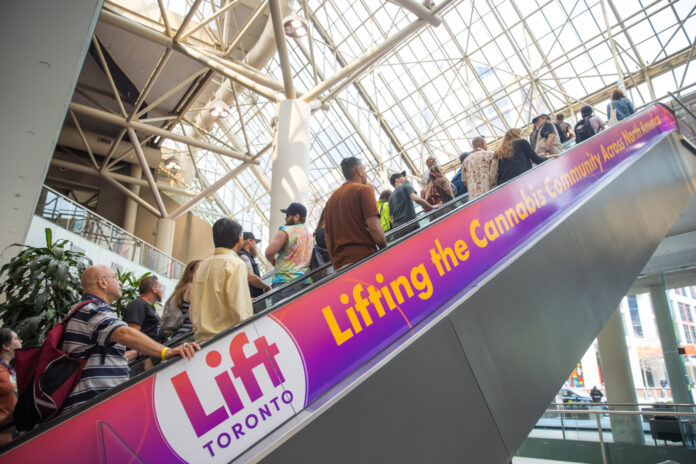Professionals have many reasons for attending cannabis events both domestically and internationally. The obvious: expanding business into new markets, meeting clients in person, and discovering innovation. Then, there’s also the benefit of large-scale discussions about how to adapt in a fast-paced, ever-evolving sector.
The Lift Cannabis Conference & Expo in Toronto, Canada, checked all those boxes. This year’s agenda presented a list of change agents, including Muskoka Grown Chief Executive Officer John Fowler, Spirit Leaf and Superette President Dave Marino, and Abi Roach, a longtime cannabis activist and head of marketing, customer experience, and merch at Mera Cannabis.
“Everyone was buzzing about the keynote from David Lobo, president and CEO of [government-owned] Ontario Cannabis Store,” said Lindsay Roberts, portfolio lead for the trade show’s parent company, Lift Events & Experiences. “His talk opened the Lift Cannabis Business Conference.”
Lobo discussed the dangers of lowering cannabis prices, calling price-cutting a “race to the bottom” competitive strategy. “Once you condition consumers to certain prices, it may take a generation to change perceptions and price tolerances,” he said. In an economy where all consumer goods have been impacted by inflation, the cannabis industry cannot afford to drive prices into the ground, he added.
According to Statistics Canada, the average price for a gram of legal cannabis was CAN$10.29 in 2019. Now, customers can find flower for less than CAN$4 per gram.
Lobo previously indicated Ontario Cannabis Store will lower its price margins this fall. The move is expected to put CAN$35 million back into cannabis producers and manufacturers this fiscal year, rising to approximately CAN$60 million in 2024.
He also reminded the industry the marketplace is far different now from what it was in 2018, when optimism reigned supreme. “We are no longer in the early days of legalization anymore,” he said. “That dank new-car smell of legal cannabis has worn off.”
The debate about raising THC limits for edibles also received attention during Lift Toronto. In Canada, edible products cannot contain more than 10mg THC per package. Niel Marotta, president and CEO of Indiva, is an advocate for raising the limit. Indiva is the Canadian manufacturer of Wana gummies and Bhang chocolate, along with a number of other popular brands. During his appearance on a panel about brand-building, he reiterated his position that the 10mg rule is allowing the black market to flourish.
“We’ve ceded half to two-thirds of this market to the illicit market as a result of these potency limits, which, while perhaps well-intended, really have forced people to go back to the illicit market for the potency and price point they want,” he said.
Lift also devoted significant attention to established and emerging international markets. In a session called “World View,” a panel of experts discussed developments around the globe, including opportunities in Germany for international cultivators and the ongoing expansion of South American markets.
Lift’s Roberts explained the expanded market focus allowed the industry to consider “the challenges and rewards of working in the international cannabis marketplace, including important discussions about regulations, policy, and opportunities on the global stage.
“This isn’t an easy time in the cannabis industry, so in-person events like Lift are more important than ever,” she said. “You could feel the positive energy at the conference, on the expo floor, and at the Lift after-party. The community really came together to support each other. Lift Toronto was a meaningful and uplifting experience that won’t soon be forgotten.”










[…] our full event coverage here and enjoy the following […]